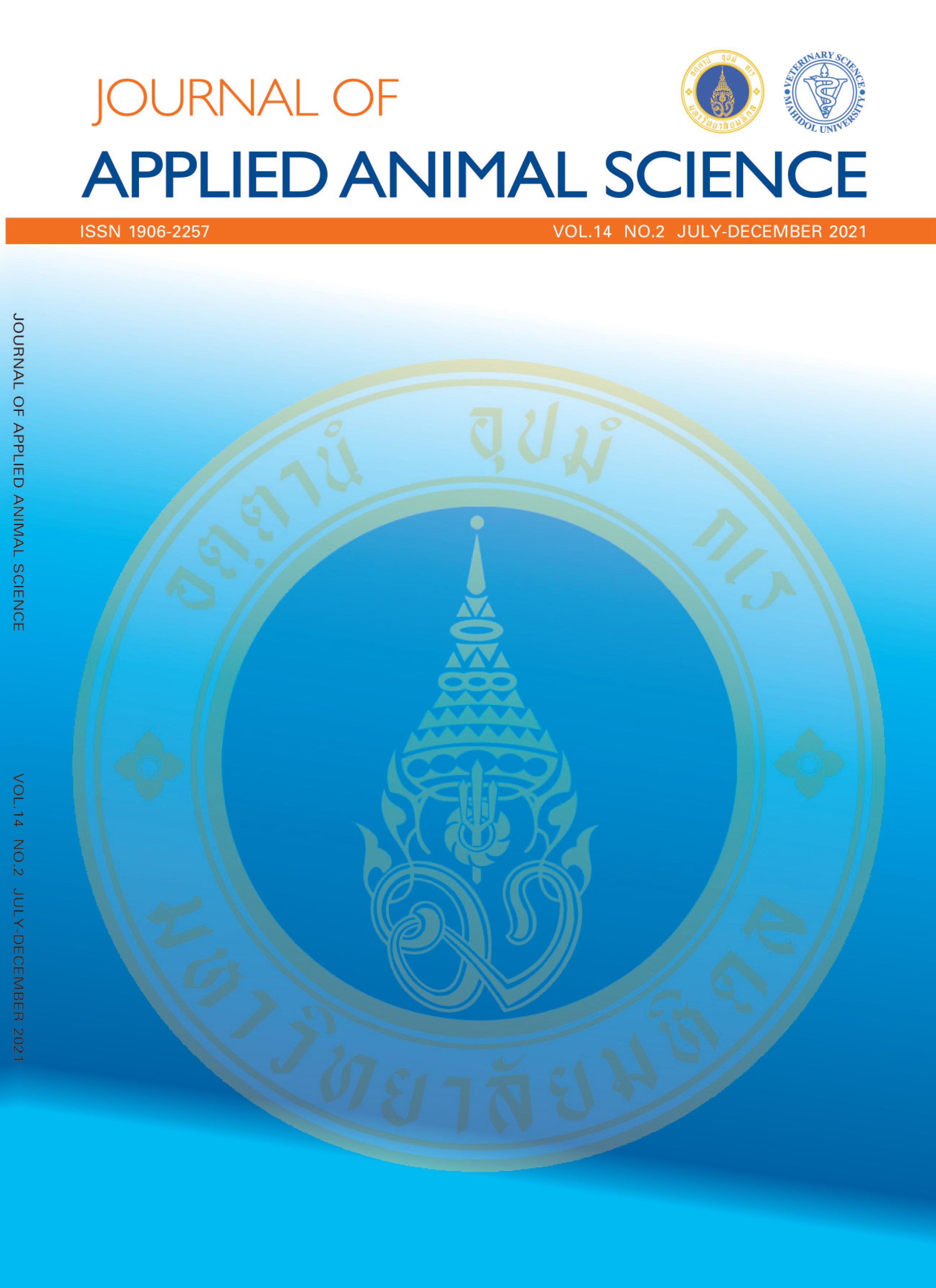Assessment of Two New Commercial Rapid Tests for Canine N-terminal Pro-B-type Natriuretic Peptide to Distinguish the Severity of Mitral Valve Disease in Dogs
Keywords:
N-terminal pro-B-type natriuretic peptide, NT-pro-BNP, mitral valve disease, dogsAbstract
N-terminal pro-B-type natriuretic peptide (NT-pro-BNP) is a potential cardiac biomarker released primarily from ventricular myocytes. Previous studies in dogs suggest that the NT-proBNP assay can be used to distinguish dogs with respiratory signs between congestive heart failure and primary respiratory illnesses.
The objective of this study is to determine and assess the clinical sensitivity and specificity of the two new NT-proBNP immunoassay tests for distinguishing dogs affected by myxomatous mitral valve disease (MMVD) between with and without congestive heart failure (CHF), as well as between dogs with MMVD and normal dogs. Thirty-seven dogs were enrolled in this study. Thirty-two dogs were measured by the NT-proBNP immunoassay test (Bionote®), including 11 healthy dogs, 11 dogs with MMVD stage B2 (absence of CHF) and 10 dogs with MMVD stage C (presence of CHF). Twenty-eight dogs were measured by the NT-proBNP rapid detection kit
(Dianotech®), including 6 healthy dogs, 7 dogs with MMVD stage B2 and 15 dogs with MMVD stage C.
The median NT-proBNP concentration in dogs with MMVD stage C was significantly higher than the median NT-proBNP concentration in dogs with MMVD stage B2 and normal healthy dogs (p-value <0.001).
The Receiver operating characteristic (ROC) curve analysis showed that serum NT-proBNP concentration could differentiate dogs with CHF signs (MMVD stage C) from dogs without CHF signs (normal healthy dogs and MMVD stage B2. The area under the curve (AUC) was 0.932 and 0.928 for NT-proBNP Bionote® and Dianotech®
test, respectively. It also could discriminate dogs affected by MMVD with CHF (MMVD stage C2) from dogs affected by MMVD without CHF (MMVD stage B2) with AUC of 0.818 and 0.867 for NT-proBNP Bionote® and Dianotech® tests, respectively. In conclusion, the results suggested that serum NT-proBNP concentrations tests from both companies could discriminate between dogs affected by CHF from those without CHF and normal healthy dogs with reasonable accuracy.
References
Alibay Y, Beauchet A, El Mahmoud R, Schmitt C, Brun-Ney D, Benoit MO, et al. Plasma N-terminal pro-brain natriuretic peptide and brain natriuretic peptide in assessment of acute dyspnea. Biomed Pharmacother. 2005;59(1-2):20-4.
Borgarelli M, Crosara S, Lamb K, Savarino P, La Rosa G, Tarducci A, et al. Survival characteristics and prognostic variables of dogs with preclinical chronic degenerative mitral valve disease attributable to myxomatous degeneration. J Vet Intern Med. 2012; 26(1):69-75.
Boswood A, Dukes-McEwan J, Loureiro J, James RA, Martin M, Stafford-Johnson M, et al. The diagnostic accuracy of different natriuretic peptides in the investigation of canine cardiac disease. J Small Anim Pract. 2008;49(1):26-32.
Buchanan JW. Chronic valvular disease (endocardiosis) in dogs. Adv Vet Sci Comp Med. 1977; 21:75-106.
Fine DM, DeClue AE, Reinero CR. Evaluation of circulating amino terminal-pro-B-type natriuretic peptide concentration in dogs with respiratory distress attributable to congestive heart failure or primary pulmonary disease. J Am Vet Med Assoc. 2008; 232(11):1674-9.
Fox PR, Oyama MA, Hezzell MJ, Rush JE, Nguyenba TP, DeFrancesco TC, et al. Relationship of plasma N-terminal pro-brain natriuretic peptide concentrations to heart failure classification and cause of respiratory distress in dogs using a 2nd generation ELISA assay. J Vet Intern Med. 2015;29(1):171-9.
Hosoda K, Nakao K, Mukoyama M, Saito Y, Jougasaki M, Shirakami G, et al. Expression of brain natriuretic peptide gene in human heart. Production in the ventricle. Hypertension. 1991;17(6 Pt 2):1152-5.
Januzzi JL, Jr., Camargo CA, Anwaruddin S, Baggish AL, Chen AA, Krauser DG, et al. The N-terminal Pro-BNP investigation of dyspnea in the emergency department (PRIDE) study. Am J Cardiol. 2005;95(8):948-54.
Keene BW, Atkins CE, Bonagura JD, Fox PR, Haggstrom J, Fuentes VL, et al. ACVIM consensus guidelines for the diagnosis and treatment of myxomatous mitral valve disease in dogs. J Vet Intern Med. 2019;33(3):1127-40.
Mueller T, Gegenhuber A, Poelz W, Haltmayer M. Head-to-head comparison of the diagnostic utility of BNP and NT-proBNP in symptomatic and asymptomatic structural heart disease. Clin Chim Acta. 2004;341(1-2):41-8.
Oyama MA, Fox PR, Rush JE, Rozanski EA, Lesser M. Clinical utility of serum N-terminal pro-B-type natriuretic peptide concentration for identifying cardiac disease in dogs and assessing disease severity. J Am Vet Med Assoc. 2008;232(10):1496-503.
Swedberg K, Cleland J, Dargie H, Drexler H, Follath F, Komajda M, et al. Guidelines for the diagnosis and treatment of chronic heart failure: executive summary (update 2005): The Task Force for the Diagnosis and Treatment of Chronic Heart Failure of the European Society of Cardiology. Eur Heart J. 2005;26(11):1115-40.
Thomas CJ, Woods RL. Haemodynamic action of B-type natriuretic peptide substantially outlasts its plasma half-life in conscious dogs. Clin Exp Pharmacol Physiol. 2003;30(5-6): 369-75.
Downloads
Published
How to Cite
Issue
Section
License
Copyright (c) 2022 Mahidol University Faculty of Veterinary Science

This work is licensed under a Creative Commons Attribution-NonCommercial-NoDerivatives 4.0 International License.
Published articles are under the copyright of the Journal of Applied Animal Science (JAAS) effective when the article is accepted for publication. The editorial boards claim no responsibility for the content or opinions expressed by the authors of individual articles in this journal. Partially or totally publication of an article elsewhere is possible only after the consent from the editors.



